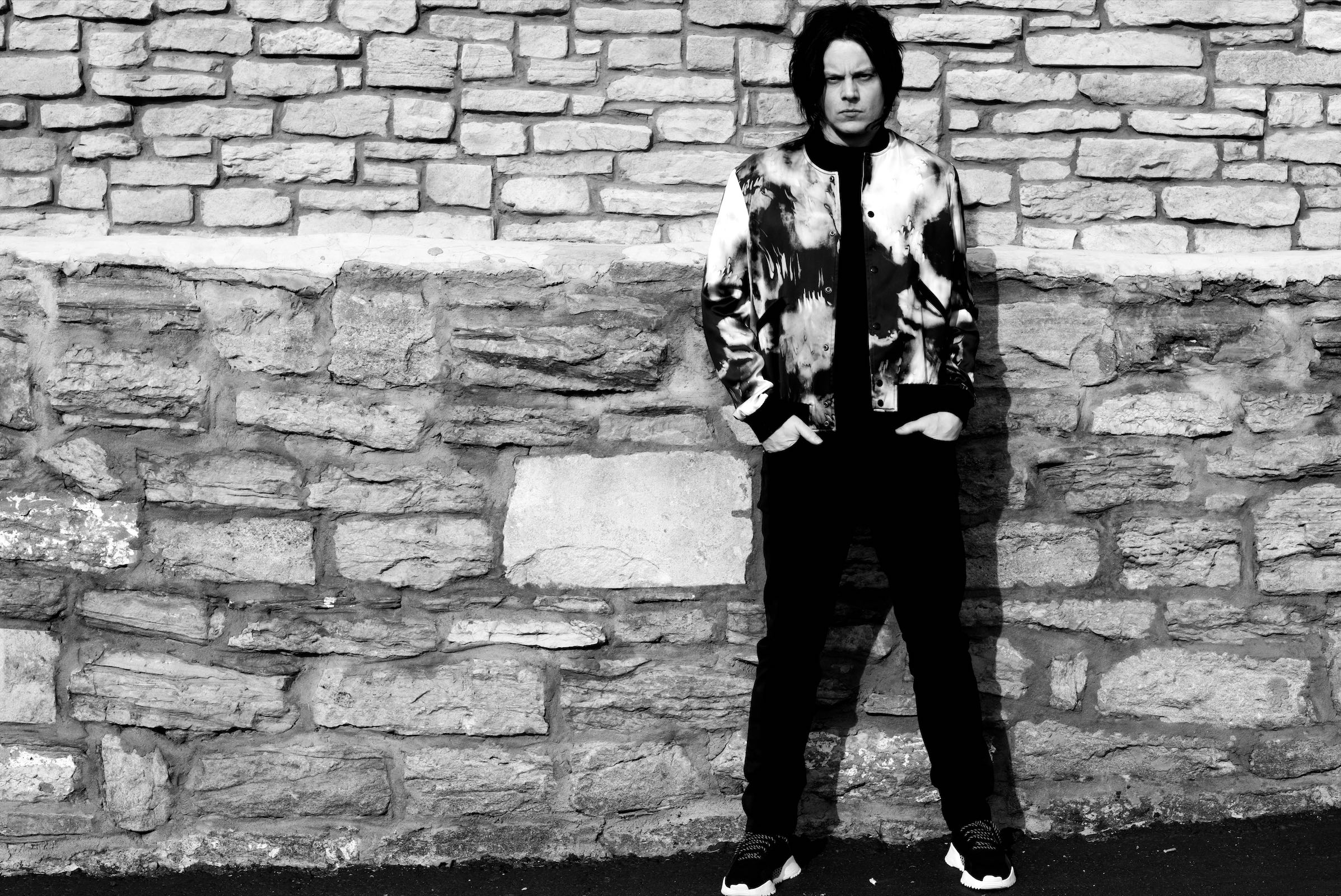Jack White remains as surprised as anyone about the meteoric rise of The White Stripes. “What that band was on paper, it should have never worked at all in the mainstream,” he says over the phone from his office at Third Man Records in Nashville. “We never thought that anyone in the mainstream was going to dig that kind of stuff.” I tell him I understand the sentiment.
The first time I saw him play with Meg White, at a tiny punk club in Bloomington, Indiana, in 2001, I was as impressed with the unhinged quality of the performance as I was with the music itself. Berserk as the band was—Meg’s head-tossing as erratic as her drum hits, thrift store guitar-shredding Jack a Hatter-esque maestro of his own mad creation—they made sense among the groundswell of modern garage acts I’d grown interested in from Detroit like The Gories, The Dirtbombs, and The Detroit Cobras. Garage rock–focused labels like Sympathy for the Record Industry and In the Red were having a moment, and The White Stripes felt ripe for this era of the underground. Their intentional filtration through a red, black, and white color palette, in addition to their stripped-down dynamic, was a distinguishing novelty that felt at once referential and contemporary. It was great, but at that point marginal. I would never have imagined that Conan O’Brien, Beyoncé, and my dad would also one day become fans.
White vehemently agrees. “For anyone to care about what you’re doing—and want to relate to it and share it in any sort of way—is an incredible thing,” he says. “It’s an impossible task to set out and do. It’s beyond your control. It’s beyond your own passion and your own ego.” The point of such proclamations, White insists, isn’t a requisite sense of false modesty that often comes with a visible profile such as his. The point is that it’s difficult to know what will resonate with music fans and what won’t.
So he does his own thing. White cooks by instinct, boiling a very distinct pot of historical references and personal influences, and then simply hopes that some of the song-noodles he later hurls stick. This ambivalence to trends and industry norms has worked, it seems. His last solo album, 2014’s Lazaretto, sold 138,000 copies in one week, 40,000 of those on vinyl. Today, lines of rabid fans snake through the streets outside of Third Man retail storefronts in Nashville and Detroit upon the release of any White-related record or scheduled performance. Like it or not, he’s become as culturally synonymous with these cities as Music Row and Motown. Third Man, through its album releases, concert programming, and displays stuffed with limited edition 45s, t-shirts, and totes—not to mention books, turntable slipmats, and, uh, water bottles—serves as the ashram for throngs of White Stripes, Raconteurs, and Dead Weather fans old and new. Jack White, the ever-charismatic leader.
His Tarantino-esque obsessions with craft, analog equipment, and figureheads of bygone eras have manufactured a cultural caricature of White as an old-timey history fetishist in a bowler hat. (Related: he’s been known to sport a bowler hat.) “But that’s not what my brain is about,” he insists. “If it was, I’d say, ‘I hate the modern world and I love the old world and that’s it.’” Instead, he adds, his creative end goal, from The White Stripes’ 1999 full-length debut to his new solo record, has always been innovation—even if he’s looking to the past for inspiration. “Most of the time people only notice the old part with me, and that’s OK,” he says. “But really what I’m trying to do is get somewhere new.”
“Most of the time people only notice the old part with me, and that’s OK. But really what I’m trying to do is get somewhere new.”
His new record, Boarding House Reach, doubles down on that aim. The idea was born of confinement, when, last year, White cordoned himself off in a small, unassuming apartment in Nashville to write songs with gear replicating his bedroom setup as a teen in Detroit. He explains that it became essential to disengage in the day-to-day distractions commensurate with the Internet and the friends and colleagues he’s surrounded by at Third Man. “It was an interesting creative prison,” he says with a laugh. The meager setting allowed him to contemplate where he came from, and where he plans to go next.
Though the demos were conceived in solitude, the execution of the songs could not have been more different. After writing the bulk of the material, White traveled with it to Sear Sound in Manhattan, Capitol Studios in Los Angeles, and his own Third Man studio in Nashville, where he enlisted a sprawling cast of studio musicians to flex their muscles. Session pros like bassist NeonPhoenix (Kanye West, JAY-Z, Miguel), drummer Louis Cato (Beyoncé, John Legend, Mariah Carey), and gospel trio The McCrary Sisters all contributed their ideas over White’s song sketches. Not unlike his days in The Raconteurs and The Dead Weather, he became the conductor of a carefully selected cast of contributors who realized his vision by expanding upon it, adding individual flourishes and personality.

left photo by David James Swanson / right photo by Theon Delgado
“What I’m doing is capturing real musicians going all in on an idea,” White explains. “I write a chord change and they come up with something really interesting on a clavinet or a drum machine. They come up with something I would have never played myself.” It’s a curious reliquinshing of control for a solo album, particularly because the sprawling labor pool was selected by a man who built his name on stripped-down formats and production. Taken in context, it’s a fairly conspicuous extension of his reticence to do the same thing over and over.
Today, White even cops to the drawbacks of the duo format, or a one-man-show mentality. “You lose things when you’re trying to play all of the instruments yourself,” he explains. In its final state, Boarding House Reach is, in fact, a montage of ideas, he adds, and his concerted effort to blend the chemistry and emotion of everyone in the room. And the record is…bonkers.
The lead single is a gospel-influenced dirge reflecting on the attack mode of American society, prompted by the Trump administration. “The title ‘Connected By Love’ is simple,” White says. “Maybe too simple.” He adds that when he’s writing about difficult subject matter, he often funnels his thoughts and feelings through a blues-inspired, one-man-against-the-world perspective. On Boarding House Reach’s “Over and Over and Over,” he sings, “My shoulder holds the weight of the world.” But he’s quick to clarify that the songs are not personal confessions in the traditional sense. “This is not about me,” he explains. “This is not about my life. I don’t want any of that garbage.”
The sound broth White simmers on Boarding House Reach includes touchstones of hip-hop, blues, psychedelia, rock and roll, and even jazz. Album coda “Humoresque” is drenched in Tin Pan Alley, reportedly from sheet music Al Capone wrote while imprisoned at Alcatraz. There are drum breaks, wild synthesizers, raging guitar solos, and strings. White’s take on rapping—a kind of maniacial spoken word, often with a piercing lilt—finds an increasing presence on the album. The record is unlike anything he’s ever done. While there are no obvious hits, it certainly checks White’s required boxes: unique, forward-thinking, collaborative.
At this point in his career as a solo artist, band member, producer, actor, and entrepreneur—what some might consider an empire-builder—it would be easy to snark about how massive royalties from hits like “Seven Nation Army,” “Icky Thump,” and “Fell in Love with a Girl” can’t hurt in fostering a total disregard for the commercial success of an idea. But it’s worth noting that White’s a guy who was once content to upholster furniture and record in his living room. Money has certainly enabled his expansion, but I’m not convinced that it’s changed his creative worldview.
“It’s so much more beautiful for someone to want to leave the Ford motor plant to come and learn to work at our record plant. That’s a beautiful story to me.”
There’s the mania of Boarding House Reach, and another case in point: A survey of the Third Man Records roster reveals no blockbusters, save for White’s own projects and perhaps rising outlaw country musician Margo Price. Reissues of Blind Willie McTell tunes rest alongside singles by Michigan-based noise artist Wolf Eyes and transgressive auteur John Waters, the only obvious connection being that they are a reflection of White and the Third Man crew’s personal tastes. There’s no marked sense that the operation is simply chasing hits. How the label’s finances break down is a mystery, but White’s catalog is certainly the biggest seller. (Boarding House Reach debuted at number one.) And a recent admin deal inked between White’s publishing operations and Universal Music Publishing Group—a move to increase the presence of his repertoire in the world of music licensing—will no doubt help the future of Third Man.
Unlike the collection of session pros White rounded up for his new album, Third Man leans heavily on White’s extended family, old friends from the Detroit music scene, and Nashville and Detroit locals for its day-to-day operations. White explains that in the traditional world of record labels, the goal is to hire the best person on paper—the shrewd ladder-climber from New York or Los Angeles with an advanced degree. But White, of course, is anything but traditional. “It’s so much more beautiful for someone to want to leave the Ford motor plant to come and learn to work at our record plant,” he says. “That’s a beautiful story to me.” It’s a way of keeping with his Detroit-bred working-man ethos and the community that nurtured his art and ambition early on.

photo by Theon Delgado
On the phone, White is casual in conversation, but passionate in his answers. He pauses before speaking, and apologizes for rambling on. He cites books, articles, and influences rapidly—cutting room floor material from The Wizard of Oz, Mama Cass mythology, inside-baseball knowledge of Greta Garbo, a book he read about Frida Kahlo. At the end of our long conversation, he thanks me for my time and “intelligent questions,” as if I’m an exception to the rule. It leaves me to wonder if he’s inundated with inanity on the regular, or simply a master of blowing smoke.
Though often dogged in coverage by a now-famous temper, beginning with a Detroit bar fight in 2003, White speaks softly and lovingly of his children, his support of gender fluidity and gender neutral pronouns, and his belief that creativity should be the driving force of everything. “Most of the ideas we have at Third Man are not money-making ideas,” he adds. “They’re not smart business moves, because they come from a creative idea rather than the almighty dollar.”
When I bring up the idea of misperceptions of him in the press, his unexpectedly deep voice lilts like in his songs. I brace myself for a tirade, but he’s measured. “Oh, there are a lot—that just comes with the territory,” he says. “Pick up a tabloid and you’ll see nothing but lies, and those enter living rooms across the world and people believe them.” He mentions his intentional acts of misdirection and his drive to shelter the things most precious to him—namely his children and loved ones. Given his protective nature and somewhat mythical status, I ask if he’d ever write a memoir, like the books he devours about his idols. “I don’t know if I should write about myself or not… That’s a tough one,” he says with a laugh. “I guess we live in the age of the selfie, right? Maybe I should just jump in the pool and swim.” FL
This article appears in FLOOD 8. You can download or purchase the magazine here.







